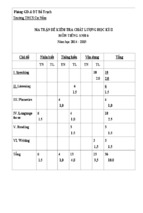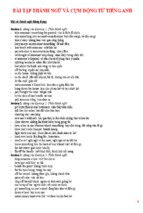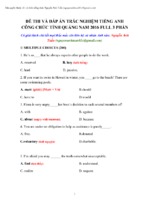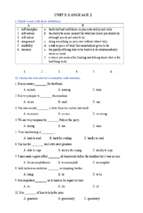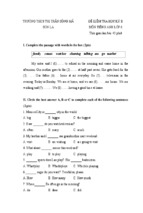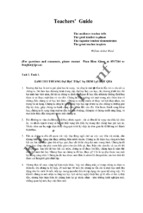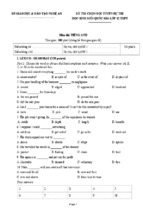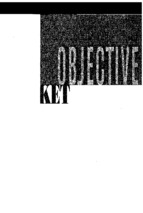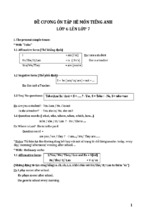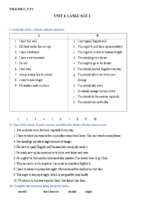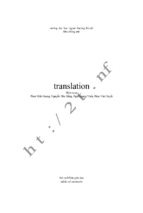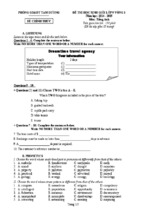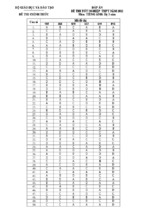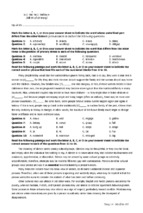visit the link to get test
Website : https://1001dethi.com/ dt 0909265875 .thầy phúc
SÁCH STARTERS :
Cụ thể : 1 bộ sách Starters 9 cuốn +audio listening
Trọn gói : 50.000Đ.
SÁCH MOVERS :
Cụ thể : 1 bộ sách Movers 9 cuốn + audio listening
Trọn gói : 50.000Đ.
SÁCH FLYERS :
Cụ thể : 1 bộ sách Flyers 9 cuốn +audio listening
Trọn gói : 50.000Đ
SÁCH KET :
Cụ thể : 1 bộ sách KET 10 cuốn +audio listening
Trọn gói : 50.000Đ
SÁCH PET :
Cụ thể : 1 bộ sách PET 8 cuốn +audio listening
Trọn gói : 40.000Đ
SÁCH Longman New Real Toeic (Trọn bộ 3 cuốn RC,LC và Full)
Trọn gói : 30.000Đ
PASSIVE VOICE
The passive is formed with the appropriate tense of the verb to be + past participle.
Only transitive verbs (verbs which take an object) can be put into the passive.
TENSES
Present Simple
Present Continuous
Past Simple
Past Continuous
Future Simple
Present Perfect
Past Perfect
Future Perfect
Present Infinitive
Perfect Infinitive
-ing form
Perfect -ing form
Modal + be + p.p.
ACTIVE VOICE
PASSIVE VOICE
He gives lectures.
He is giving a lecture.
He gave a lecture.
He was giving a lecture.
He will give a lecture.
He has given a lecture.
He had given a lecture.
He will have given a
lecture.
He should give a lecture.
He should have given a
lecture.
She remembers him giving
a lecture.
Having given the
lecture,...
He must give a lecture.
Lectures are given.
A lecture is being given.
A lecture was given.
A lecture was being
given.
A lecture will be given.
A lecture has been given.
A lecture had been given.
A lecture will have been
given.
A lecture should be given.
A lecture should have
been given.
She remembers a lecture
being given.
The lecture having been
given,...
The lecture must be
given.
• Present Perfect Continuous, Future Continuous and Past Perfect Continuous are not
normally used in the passive.
• Get is used in colloquial English instead of be to express something happening by
accident.
She'll get killed if she goes on driving like that.
THE PASSIVE IS USED
• when the person who performs the Her flat was broken into yesterday. (by
action (agent) is unknown, unimportant a burglar - obvious agent)
or obvious from the context
• to emphasise the agent
Her wedding dress was delivered to her
by the dressmaker herself yesterday.
• to make statements more formal or My dress has been ruined. (more polite
polite
than saying ‘You have ruined my dress’.)
• when we are more interested in the
A Christmas bazaar will be held
action than the agent, such as in news
tomorrow.
reports, formal notices, instructions,
processes, headlines, advertisements etc.
CHANGING FROM ACTIVE INTO PASSIVE
• The object of the active verb becomes the subject in the passive sentence. The
active verb changes into a passive form and the subject of the active verb becomes
the agent, which is either introduced with "by" or is omitted.
Active Voice
Passive Voice
Subject
Verb
Object
Subject
Verb
Agent
John
posted
the letters.
The letters
were
posted
by John.
• By + agent is used to say who or what did the action. She was knocked over by a
car. With + instrument /material is used to say what the agent used or after past
participles such as coloured, crammed, crowded, filled, flavoured, packed etc. She
was killed with a hammer. By + agent is omitted when the agent is unknown,
unimportant, obvious from the context or referred to by words such as: someone,
people, I, etc. They revealed the truth. – The truth was revealed. (‘by them’ is
omitted)
• Verbs which take who objects (give, offer etc) form their passive in two ways; it
is more usual to start the sentence with the person object, not the thing object. They
offered Ann a bunch of flowers. – Ann was offered a bunch of flowers. (more usual
than: A bunch of flowers was offered to Ann.)
• Verbs followed by a preposition (accuse of, take down etc) take the preposition
immediately after them when turned into the passive. She took down the minutes of
the meeting. – The minutes of the meeting were taken down.
• In passive questions with who, whom or which we do not omit by. Who gave you
this information? – Who were you given this information by?
• Hear, help, make, see are followed by a to-infinitive in the passive. She made me
work overtime. – I was made to work overtime. Note that hear, see, watch can be
followed by a present participle in the active and passive. We saw her crying. – She
was seen crying.
Write sentences in the passive as in the example:
1. (Her hair/dye/at the moment) – Her hair is being dyed at the moment.
2. (The Queen/not drive/to the embassy/yet)
3. (The Hay Wain/paint/Constable)
4. (Most olives/grow/the Mediterranean)
5. (The convict/take/to prison/now)
6. (His wound/not treat/yet)
7. (My car/break into/last night)
8. (The trees/prune/a tree surgeon/last week).
9. (Reservations/can/make/by dialling 001 now)
10. (Our house/clean/weekly)
11. (He/bring up/his grandparents)
12. (The book/not write/yet)
13. (The building/demolish/by next year)
14. (The new school/open/next week/the mayor)
15. (Sally's shoes/re-heel/last Saturday)
16. (The dustbins/empty/recently)
2. Put the verbs in brackets into the correct passive form.
1. Holland ...is said... (say) to be one of the prettiest countries in Europe.
2. I hate ………………………………..
(tell) lies.
3. My television …………………………......
(deliver) tomorrow.
4. Their telephone ……………………..
(install) yesterday.
5. Teachers ought ……………………..
(pay) a higher salary.
6. Hotel rooms must
………………………… (vacate) by 12 noon.
7. The villa …………………………....
(sell) by public auction next week.
8. She hopes her home ………………..
(build) by May.
9. Heartbreak House
……………………. (write) by George Bernard Shaw.
10. My car ………………………... ……. (respray) at the moment.
11. Hopefully, she ……………………..
(promote) by the end of next month.
12. I wish I ……………………… (teach) how to type when I was at school.
13. Your application should …………...
(hand in) last Monday. It's too late now
I'm afraid!
14. The wedding reception must ………. (book) a month before the wedding.
15. The building …… (evacuate) ten minutes before the explosion took place.
16. Polar bears ………………….. (hunt) for their fur.
17. A lecture …………………….. (give) in the main hall at the moment.
18. After ................... (award) a medal for bravery, he became a local hero.
19. Her ankle ………………………….
(hurt) when she fell down.
20. She thinks her car ………………………...
(steal) by someone she knows.
21. The apartment ……………………... (sell) last week.
22. I hate ………………….. (lie to) by my friends.
23. Nurses really ought ……………………….. (pay) more than they are.
24. The music must ……………………. (turn down) by 12 o'clock at the latest.
25. Your free gift ………………… (send) to you in the next few days.
26. I wish I ……………....... (teach) how to use a computer when I was at
school.
27. Human bones ………………………. (find) by archaeologists yesterday.
28. My car ………………… (repair) at the moment, so I can't give you a lift.
29. New York ……………... (say) to be one of the most dangerous cities in the
world.
30. Hopefully, all forms of discrimination …… (wipe out) by the end of this
century.
3. Change the sentences from the active into the passive. Omit the agent where it
can be omitted.
1. The British eat over thirty million hamburgers each year.
...Over thirty million hamburgers are eaten by the British each year....
2. Who wrote "One Hundred Years of Solitude?"
3. The bad weather has spoiled my holiday plans.
4. Do they pay their workers on time?
5. The children picked the strawberries.
6. She saw them go out.
7. You should wash those walls before you paint them.
8. Penguin have translated all her books into English.
9. He objects to people telling him what to do.
10. Tesco are converting the old bank into a supermarket.
11. They told him not to say anything to her.
12. Did they give you a reward for finding their cat?
13. The nurses take very good care of the patients.
14. Everyone heard her shouting at the students.
15. Why have they given him a promotion?
16. I love people giving me presents.
17. When we got to the theatre, they had sold all the tickets.
18. The police have just arrested the man who broke into our house.
19. What did he tell you to do?
20. Oxlam will hold a fashion show next week.
21. They are holding the next World Cup in France.
22. When did they demolish that building?
23. The officers took the suspect in for questioning.
24. Will they hand out free T-shirts at the concert?
25. Does the school provide accommodation for all new teachers?
4. Change the sentences from the passive into the active.
1. Why was James asked to leave the club?
...Why did they ask James to leave the club?...
2. They love being invited to parties.
3. The best cream cakes are made by Sayers.
4. By the end of the party all the food had been eaten.
5. Sanchez was beaten by Graff in the Women's Tennis Final.
6. My glasses must have been thrown away by mistake.
7. The building is being examined by Health and Safety experts this week.
8. Who was the television invented by?
9. She was heard complaining about the new timetable.
10. She was sent a telegram by the Queen on her 100th birthday.
11. The English language is now spoken by over two billion people worldwide.
12. My overdraft is being extended by the bank tomorrow.
13. Hundreds of free gifts are being given away by Donels this Saturday.
14. Why haven't the beds been made yet?
15. I hate being taken for granted.
16. The tickets should have been booked weeks ago.
17. A new shopping centre is being built on the outskirts of town.
18. Why wasn’t I told about the meeting?
19. Further information can be obtained from your local post office.
20. When will you be interviewed for the post?
21. Who was Gilbert interviewed by?
22. She hasn't been christened yet.
23. A new shampoo is being developed in the lab.
24. The awards will be presented by Tom Hanks.
25. Rainforests are being cut down in the Amazon.
5. Fill in ‘by’ or ‘with’.
1. This suit was designed ...by... Armani.
2. This cake is filled ………….fresh cream.
3. Who was Australia discovered ………….?
4. Ford cars are made …………
experts.
5. The baby was covered ……………. a blanket
6. 'Carmen’ was composed ………...
Bizet.
7. The coat was lined ………… fur.
8. The food will be provided ………...
caterers.
9. The stew was flavoured …………. garlic.
10. The Royal Wedding was watched ………….......
millions.
6. Change the sentences from the active into the passive. Omit the agent
where it can be omitted.
1. Santa Claus will leave your presents in the stocking.
...Your presents will be left in the stocking by Santa Claus…
2. Bad organisation spoiled their holiday.
3. Teachers mark hundreds of exam papers every year.
4. Who wrote Romeo and Juliet?
5. You should dry your hair before you go out.
6. You mustn't tell him the truth.
7. She likes people taking her to the theatre.
8. Why didn't they give her the job?
9. She told them not to tell anyone.
10.They should have given us a bonus.
11.The doctors will bring him in for an examination.
12. Fog has delayed all flights.
13.She didn't send me any parcels.
14.She had cleaned the house before I got there.
15.When we arrived at the hotel, they had filled all the rooms.
16.Why haven't you invited Mary to the party?
17.Paula will help you finish your project.
18.The mayor is opening the new community centre next week
19.We heard her complaining strongly to the manager.
20.You can leave your bags at the left-luggage office.
21.Workmen found some antique vases in the old house.
22.The architects have drawn up plans for the new library.
23.Who gave him the new car?
24.They are going to set the lion free next week.
25.What time do you expect him to arrive?
7. Change the sentences from the passive into the active.
1. Who was the Mona Lisa painted by?
...Who painted the Mona Lisa?...
2. The old barn has been pulled down.
.
3. The results will be published in July.
4. The trip was ruined by bad weather.
5. The letter should have been posted last week.
6. Who was the money raised by?
7. Why hasn't the house been painted yet?
8. She was heard shouting.
9. How much were you paid?
10.His car has been stolen.
11.I can't bear being cheated.
12.A famous actress will be chosen to advertise the product.
13.John was made to do the washing up.
14.The ozone layer is gradually being destroyed by pollution.
15.A bring-and-buy sale is being held next month.
16.Our house was done up by a famous interior decorator.
17.The cracks in the wall were caused by the earthquake.
18.Thousands of rare birds are killed by hunters every year.
19.Her purse was stolen on the bus.
20.When will we be told the time of his arrival?
21.An ancient village has been uncovered by archaeologists.
22.Why hasn't the dishwasher been repaired yet?
23.A new drug is being developed by scientists.
24.A new breed of cow is to be introduced into the country by
farmers.
25.The furniture will have been removed by noon.
26.Who were you going to be replaced by?
27.The island is being ruined by tourists.
28.Two rooms had been booked for her by her travel agent.
29.She was seen to leave the building.
30.Seats should have been reserved a week ago.
8. Fill in ‘by’ or ‘with’.
1. The Magus was written ...by... John Fowles.
2. Who was the radio invented …………..?
3. The cyclist was knocked down …………… a bus.
4. Soup is eaten ………….. a spoon.
5. The car was fixed …………. a mechanic.
6. The glass was cut …………….. a special tool.
7. Her hair is coloured ………….. henna.
8. ‘Born in the USA’ was sung ……………. Springsting.
9. The roast was flavoured ……………… wine.
10.Music will be played ………………… the local band.
9. Change into the passive.
A Police are investigating a series of break-ins in the Hattersby area.
Residents have heard noises, but nobody has actually seen anything
suspicious. The recent rise in crime in the neighbourhood has shocked
residents. Locals are discussing matters of security with the police and they
have requested greater police presence in the area.
B A wealthy businessman has just bought the Black Swan Hotel. The
Barrett family owned it for many years, and they should have restored the
building many years ago, but they couldn’t find enough money. The new
owner is closing the hotel for a few months for redecoration. At the moment
workmen are polishing the floors and redecorating all the rooms.
C Mr Owen Gibbon has discovered a valuable oil painting in the attic of his
house in Rochester. George Stubbs, the famous animal artist, painted the work
in 1760. Mr Gibbon's great-grandfather bought the picture in the 1890s, but
after his death the family stored it away in the attic. Art historians are
examining the painting, and have valued it at £500,000. Mr Gibbon has offered
the work to the National Gallery, where experts will restore the picture to its
former beauty. They will have finished the restoration work by June.
D The Winter Production Company has finally released the film
which the public has been waiting for so long: The Hawk. The Winter
Company was originally going to release the film in August but they decided to
wait until October, as they know that fewer people go to the cinema in the
summer. Richard Able directed The Hawk and critics are encouraging people to
see it. Cinemas report that British audiences have bought a lot of tickets and that
they are sure The Hawk will be a success.
E Over the past ten years oil spills have polluted the seas surrounding Britain. The
tankers spill oil onto the coast and this harms many forms of wildlife. Environmentalists say
that they need a lot of volunteers if they are to minimise the damage. In future, the
government has promised that it will prosecute the owners of any tankers that pollute the
North Sea in this way. The government also hopes that they can prevent such incidents by
building more lighthouses along the coastline.
10. Change into the passive.
A Last month Samuel Block opened a restaurant in the centre of
Macclesfield. He had planned it for over five years but he only completed it
after local businessmen raised a large sum of money. A top hotelier has trained
the waiters and they will wear specially designed uniforms to fit in with the
restaurant's modern look. They have brought in a famous chef from France
and they are going to give him complete control over the daily menu.
B After 20 years of civil war the Lebanese government is rebuilding
Beirut. They will construct new offices and hotels. The authorities must also
expand Beirut airport. Luckily, bombing did not destroy archaeological sites. By
the year 2000, building companies will have completed most of the work.
Lebanon's new look will attract many tourists in the future. A few groups have
already visited this Middle Eastern paradise.
C The critics have greeted with enthusiasm "Turning Point", Marvin
Morion's new play. They regard it as his most mature work. Morton wrote it
after he had studied people's behaviour for a considerable time. On the opening
night the audience called Morton onto the stage and applauded him loudly.
They are staging the play at the Apollo Theatre where they expect thousands of
people to see it. Film companies have asked Morton to write a script for a film
based on the play. We do not know yet whether Morton will seriously consider
the proposal.
11. Put the transitive verbs into the passive. Do not mention the agent unless
it seems necessary.
1. The milkman brings the milk to my door but the postman leaves the
letters in the hall.
2. In future, perhaps, they won't bring letters to the houses, and we shall
have to collect them from the Post Office.
3. People steal things from supermarkets every day; someone stole twenty
bottles of whisky from this one last week.
4. Normally men sweep this street every day, but nobody swept it last
week.
5. The postman clears this box three time a day. He last cleared it at 2.30.
6. Someone turned on a light in the hall and opened the door.
7. Women clean this office in the evening after the staff have left; they
clean the upstairs offices between seven and eight in the morning.
8. We never saw him in the dining-room. A maid took all his meals up to
him.
9. Someone left this purse in a classroom yesterday; the cleaner found it.
10.We build well over 1,000 new houses a year. Last year we built 1,500.
11. We serve hot meals till 10.30, and guests can order coffee and
sandwiches up to 11.30.
12.Passengers leave all sorts of things in buses. The conductors collect
them and send them to the Lost Property Office.
13.An ambulance took the sick man to hospital. (Mention ambulance.)
14.We kill and injure people on the roads every day. Can't we do
something about this?
15.Dogs guard the warehouse. The other day a thief tried to get in and a
dog saw him and chased him. (A thief who …)
16.The watchman called the police. The police arrested the man.
17.Tom had only a slight injury and they helped him off the field; but Jack
was seriously injured and they carried him off on a stretcher. (Tom, who
had. . . , but Jack, who was . . .)
18.You can't wash this dress; you must dry-clean it.
19.They are demolishing the entire block.
20.He recommends fitting new tyres. (Use should)
21.He suggested allowing council tenants to buy their houses.
22.Men with slide rules used to do these calculations; now a computer
does them.
23.The court tried the man, found him guilty and sent him to prison.
24.The hall porter polishes the knockers of all the flats every day. - Well,
he hasn't polished mine for a week.
25.They are repairing my piano at the moment.
26.Passengers shouldn't throw away their tickets as inspectors may check
these during the journey.
27.They invited Jack but they didn't invite Tom.
28.The guests ate all the sandwiches and drank all the beer. They left
nothing.
29.Has someone posted my parcel?
30.Why did no one inform me of the change of plan?
31.Tom Smith wrote the book and Brown and Co. published it.
32.We shall have to tow the car to the garage.
33.I'm afraid we have sold all our copies but we have ordered more.
34.We will prosecute trespassers.
35.Someone stole my car and abandoned it fifteen miles away. He had
removed the radio but done no other damage.
36.You must keep dogs on leads in the gardens.
12. Put the transitive verbs into the passive. Do not mention the agent
unless it seems necessary.
1. They haven't stamped the letter.
2. They didn't pay me for the work; they expected me to do it for nothing.
3. He escaped when they were moving him from one prison to another.
4. She didn't introduce me to her mother.
5. A frightful crash wakened me at 4 a.m.
6. When they have widened this street the roar of the traffic will keep
residents awake all night.
7. They threw away the rubbish.
8. A Japanese firm makes these television sets.
9. An earthquake destroyed the town.
10.A machine could do this much more easily.
11.Visitors must leave umbrellas and sticks in the cloakroom.
12.We ask tenants not to play their radios loudly after midnight.
13.We can't repair your clock.
14.We cannot exchange articles which customers have bought during the
sale. (Articles...)
15.We have to pick the fruit very early in the morning; otherwise we can’t
get it to the market in time.
16.The police shouldn't allow people to park there.
17.They are watching my house.
18.The examiner will read the passage three times.
19. Candidates may not use dictionaries.
20.You need not type this letter.
21.This used to be number 13, but now I see that someone has crossed out
‘13’ and written ‘12A’ underneath.
22.You mustn't move this man; he is too ill. You'll have to leave him here.
23.They searched his house and found a number of stolen articles.
24.Nobody has used this room for ages.
25.They took him for a Frenchman, his French was so good.
26. You should have taken those books back to the library-.
27.They brought the children up in Italy.
28.They have taken down the For Sale notice, so I suppose they have sold
the house.
29.Someone broke into his house and stole a lot of his things.
30.We have warned you.
31.A lorry knocked him down.
32.They returned my keys to me; someone had picked them up in the street.
33.We had to give the books back; they did not allow us to take them
home.
34.You shouldn't leave these documents on the desk. You should lock them
up.
35.They handed round coffee and biscuits.
36.They have tried other people's schemes. Why have they never tried my
scheme?
13. Change into the passive with phrasal verbs.
1. The government has called out troops.
2. Fog held up the trains. (agent required)
3. You are to leave this here. Someone will call for it later on.
4. We called in the police.
5. They didn't look after the children properly.
6. They are flying in reinforcements.
7. Then they called up men of 28.
8. Everyone looked up to him. (agent required)
9. All the ministers will see him off at the airport. (agent required)
10.He hasn't slept in his bed.
11.We can build on more rooms.
12.They threw him out.
13.They will have to adopt a different attitude.
14.He's a dangerous maniac. They ought to lock him up.
15.Her story didn't take them in. (agent required)
16. Burglars broke into the house.
17.The manufacturers are giving away small plastic toys with each packet
of cereal.
18.They took down the notice.
19.They frown on smoking here.
20.After the government had spent a million pounds on the scheme they
decided that it was impracticable and gave it up. (Make only the first
and last verbs passive.)
21.When I returned I found that they had towed my car away. I asked why
they had done this and they told me that it was because I had parked it
under a No Parking sign. (four passives)
22.People must hand in their weapons.
23.The crowd shouted him down.
24.People often take him for his brother.
25.No one has taken out the cork.
26.The film company were to have used the pool for aquatic displays, but
now they have changed their minds about it and are filling it in. (Make
the first and last verbs passive.)
27.This college is already full. We are turning away students the whole
time.
28.You will have to pull down this skyscraper as you have not comlied with
the town planning regulations.
The verbs believe, expect, feel, hope, know, report, say, think etc are used in the
following passive patterns in personal and impersonal constructions.
• subject (person) + passive verb + to – The police report that she is in France.
inf (personal construction)
She is reported to be in France.
• it + passive verb + that-сlause It is reported that she is in France.
(impersonal construction)
14. Turn the following sentences into the passive as in the example:
1. They think he is lying.
He …is thought to be lying…. It …is thought that he is lying…
2. They believe he got lost in the forest.
He ……………………… It ………………………
3. They say she has been very ill.
She ……………………… It ……………………..
4. They said the president had been shot.
The president …………… It ………………………
5. They believe she was taking drugs.
She ……………………… It ………………………
6. They expect he will pass his driving test.
He ………………………… It …………………………
7. They said she was wrongly accused.
She ……………………… It ………………………..
8. They believe he is leaving soon.
He ………………………… It ………………………
9. They say his health is very poor.
His health ………………….. It ………………………
10.They report that some papers have been stolen.
Some papers ………………… It ……………………
11.They say he is a millionaire.
He ………………………… It ………………………
12.They expect the plane will be landing soon.
The plane ………………… It ………………………
13.They believe he was working illegally.
He ………………………… It ………………………
14.They say he is feeling better.
He ……………………… It …………………………
15.They thought he had been brave to do so.
He ……………………… It ………………………..
16.They think he has escaped from prison.
He ……………………… It ………………………
17.They expect he'll pass his exams.
He ……………………… It ………………………
18.They say she lied to the police.
She ……………………… It ……………………
19.They say they miss too many lessons.
They ……………………… It ……………………
20.They know she was always late for work.
She ……………………… It ……………………
Causative Form (have something done)
• We use have + object + past participle to say that we arrange for someone to do
something for us
He asked Sally to type the letters. He had the letters typed. (He didn't do it himself
- Sally did it.)
TENSES
Present Simple
Present Continuous
ACTIVE VOICE
She makes dresses.
She is making a dress.
CAUSATIVE FORM
She has dresses made.
She is having a dress
Past Simple
Past Continuous
Future Simple
Future Continuous
Present Perfect
Present Pert. Cont.
Past Perfect
Past Perfect Cont.
Infinitive
-ing form
She made a dress.
She was making a dress.
She will make a dress.
She will be making a
dress.
She has made a dress.
She has been making
dresses.
She had made a dress.
She had been making
dresses.
She can make dresses.
She likes making dresses.
made.
She had a dress made.
She was having a dress made.
She will have a dress made.
She will be having a dress
made.
She has had a dress made.
She has been having dresses.
She had had a dress made.
She had been having dresses
made.
She can have dresses made.
She likes having dresses
made.
• The verb to have, used in the causative, forms its negations and questions with
do/does (Present Simple) or did (Past Simple). He doesn't have his shirts ironed.
Did he have the brakes checked?
• Get is often used in the causative instead of have. Did you have/get your nails
polished?
• The causative can be used instead of the passive to express accidents and
misfortunes. He had his nose broken in a fight. (His nose was broken in a fight.)
15. Write the sentences in the causative as in the example:
1. Their wedding reception was organised by caterers.
...They had their wedding reception organised by caterers…
2. I'll ask her to make the appointment for Friday.
3. He was mending the table for Sophie.
4. He took his boots to be re-heeled.
5. Has your leg been X-rayed?
6. I will tell James to cancel the meeting tomorrow.
7. Don't ask them to post the letters.
8. I'll get the men to move this for you by this evening.
9. The mechanic is repairing her car.
10.They renovated the Smiths' house last year.
11.They are going to clean our swimming pool.
12.Where do they take their photographs to be developed?
13.He doesn't mind the barber cutting his hair short.
14.You should ask someone to water your plants while you are on holiday.
15.Will she get someone to deliver the computer?
16.She prefers sending her clothes to the dry-cleaner’s.
17.My father likes people taking his photograph.
18.Our cooker was being repaired when the lights went off.
19.Would you like someone to do the shopping for you?
20.The beautician polished the model's nails.
16. Write sentences in the causative as in the example.
1. The doctor examined Paul’s ankle. What did Paul do?
…He had his ankle examined…
2. Someone delivers her groceries once a week. What does she do?
3. A hairdresser has cut and styled Pamela's hair. What has she done?
4. Someone will repair our leaking roof. What will we do?
5. Someone cut the lawn for them while they were away. What did they do?
6. Somebody had serviced their car before they went on holiday. What had
they done?
7. A builder will do up Jan's attic. What will Jan do?
8. Someone is designing some furniture for him. What is he doing?
9. A detective investigated the case for her. What did she do?
10.Someone has written the actor's life story for him. What has he done?
11.Someone is organising a birthday party for her. What is she doing?
12.The secretary had prepared the minutes for him before the meeting. What
had he done?
13.He was building their swimming pool. What were they doing?
14.He had someone paint his daughter's portrait. What did he do?
• Make/Have + object + bare Infinitive are used to express that someone causes
someone else to do something, but their meaning is slightly different.
She made John do the shopping. (She insisted that John should do the shopping.)
She had John do the shopping. (She asked John to do the shopping.)
• Get + object + to -inf shows that someone persuades someone else to do
something.
She got Ann to tidy her room. (She persuaded Ann to tidy her room.)
17. Rephrase the following using have, get or make as in the example:
1. She insisted that they go to the meeting.
…She made them go to the meeting…
2. We are going to ask the plumber to install a new shower.
3. We persuaded Paul to lend us some money.
4. The teacher asked Sam to open the window.
5. The dentist insisted that George sit still.
6. Mrs Jones will ask the attendant to fetch her car.
7. The doctor persuaded her to go to hospital.
8. My brother insisted that I give him back his book.
9. She persuaded her friend to help her with the cleaning.
10.We’ll ask the receptionist to give him his key.
11.He insisted on them keeping quiet.
12.My father persuaded me to help him wash his car.
13.Mr Smith insisted that Jane stay late at work.
14.I'll ask Pam to turn down the radio.
15.Sue persuaded the caretaker to fix the door.
18. Complete the sentences using the words in hold. Use two to five words.
1. The hairdresser will have to cut your hair.
have You'll ...have to have your hair... cut.
2. A large dog has attacked my cat.
been My cat ………………. a large dog.
3. Her mother insisted that she buy a new dress for the party.
her
Her mother …………….. a new dress for the party.
4. Someone will steal your purse if you don't look after it.
be
Your purse ……………. if you don't look after it.
5. Jane insisted that I have some more cake.
made Jane …………….. some more cake.
6. They are resurfacing our drive tomorrow.
resurfaced We ………………. tomorrow.
7. Our furnace will need servicing soon.
have We will need ........................ soon.
8. Someone cleans my house every week.
have I ……………….. every week.
9. How did he persuade you to do it?
get
How ……………… do it?
10.She got a friend to make her an evening dress.
made She ………….. by a friend.
11.Their house had been burgled when I last saw them.
had
They ……………… when I last saw them.
12.I asked my parents to pay for my flight home.
had
I ………………. for my flight home.
13.Hooligans attacked Barney outside the stadium.
got
Barney ………….. outside the stadium.
14.She doesn't like ironing so the cleaner does it for her.
done She doesn't like ironing so ………….. by the cleaner.
15.He arranged for a friend to bring his books over from England.
had He ………………… from England.
REVISION
19. Look at the notes, then write a report using the passive.
Yet again we experienced an earthquake last night.
A remote area in northern Spain/shake/by an earthquake last night. Several
villages/totally destroy/and many people/leave/homeless. The total extent of the
damage/still not known/but luckily few casualties/ report as people warn/of the
danger earlier and many villages/evacuate. Victims of the earthquake now/
offer/shelter in local churches/where food and drink/provide.
20. Look at the prompts and make sentences using the passive. Write a
report. You can also use your own ideas.
Cues: sea/pollute - waste/dump / for years - companies/fine/last year action/take - new laws/ introduced/soon - protest marches/organised/recently people/ask not swim/at present - fishermen/advise/ fish elsewhere hope/problem solve/two years - volunteers/ask/help/clean up
21. Complete this conversation with verbs in a suitable tense, active or
passive.
Cindy and Petra are members of a volleyball team.
CINDY: Why wasn't Clare at the training session?
PETRA: Haven't you heard? She’s been thrown... (1) out for stealing.
CINDY: No! Really?
PETRA: Yes. She (2)..........................taking money from someone's bag in
the changing room.
CINDY: Who by?
PETRA: The sports club manager. She (3) …………… through the changing
room when she (4)..............................Clare with Karen's bag.
CINDY: Oh dear. That's terrible.
PETRA: Clare said she (5)........................to fetch the money by Karen but
when Karen (6) …….. about it, she said she (7) ……..... (not) what Clare
was talking about.
CINDY: But how stupid of Karen to leave money in the changing room!
PETRA: Yes. She (8) ………… that by the manager too.
CINDY: She (9) ........................ (not) it again, anyhow.
PETRA: No, I guess not. What do you think Clare (10) ……. now?
CINDY: I don't know. This is the second club she (11) … to 1eave, isn’t it?
PETRA: Yes. It's hard to know what can (12) ….. for someone like Clare.
22. Complete the sentences using the words in bold. Use two to five
words.
1. The teacher scolded Jim for not paying attention.
was Jim ...was scolded by the teacher... for not paying attention.
2. Her parents named her after her grandmother.
was She ……………………… her grandmother.
3. Most people think that broken homes cause a lot of social problems.
thought It ………………………… cause a lot of social problems.
4. An editor will check the article.
be The article ………………………… an editor.
5. The traffic warden will give you a ticket if you park there.
be You ……………………………. if you park there.
6. A lot of men enjoy football.
is Football ……………………. a lot of men.
7. The builder will have finished the extension by July.
been The ………………………….. by July.
8. The teacher has given the students their homework.
have The ……………………… their homework.
9. They are blaming Martin for the accident.
is Martin ……………………….. for the accident.
10.They are going to preview the film tomorrow evening.
is The film …………………………… tomorrow evening.
11.They will have settled the matter by this afternoon.
been The matter ……………………... by this afternoon.
23. Choose the correct answer.
1.
'Was Tom pleased with the newspaper article about him?'
'No. He was angry because his name ..B... wrong.'
A spelt
B had been spelt
C is spelt
2.
'Did you buy that picture?'
'No, it ………..to me for my birthday.'
A was given
B gave
C is given
3.
'Are you going to buy a wedding dress?'
'No. My dress ……………. by my mother.'
A is being made B is made
C made
4.
'Have you arranged the party yet?’
'Yes. All the invitations ……………….. '
A are sent
B have been sent
C sent
5.
'So, have you had your book published?'
'Yes. It ……………. in all bookshops from June 1st'
A will be
B is
C is being
6.
'Do your cats eat a lot?'
'No. They ………….. once a day, that's all.'
A is fed
B are fed
C fed
7.
'Paul is taking me to a ball this weekend.'
'I would love …………….. to a ball!'
A take B to take
C to be taken
8.
'Did you hear about the burglary last week?'
'Yes. The thieves ………… now, haven't they?'
A have been caught
B caught
C are caught
9.
'Can you swim?'
'Oh yes. I ……how to swim when I was five.'
A taught
B am taught
C was taught
10. 'Doctors have to do a lot of work.'
'Yes, but they ……… well.'
A be paid
B are paid
C pay
11. 'Where does that lady keep her jewellery?'
'It ………….. in a safe somewhere in her house.'
A is kept
B are kept
C was kept
12. 'What is happening over there?'
'Oh, a new cinema ……………… '
A is being built
B is built
C was built
13.'How is Kevin?'
'Well, his car …………….. last night, so he's upset today.'
A is stolen
B has been stolen
C was stolen
14.'What should you do if you are lost?'
'You should stay where you are and wait …………... '
A was found
B to find
C to be found
15.'Have you got Claire's phone number?'
'Yes. It …………. on this piece of paper.'
A is written
B written C be written
24. Read the situations, then write sentences using the causative form.
1. The optician is testing her eyes. What is she doing?
...She's having her eyes tested....
2. If he doesn't drive more carefully, the police will take away his licence.
What will happen to him?
3. This time tomorrow an artist will be painting her son's portrait. What
will she be doing?
4. Someone is cutting down the tree in our garden at the moment. What
are we doing?
5. They can vaccinate your children against smallpox. What can you do?
6. She will hire someone to build a shed for her. What will she do?
7. The dentist is polishing Tom's teeth. What is Tom doing?
8. The police are towing away his car. What is happening to him?
9. Someone dry-cleans his suits every month. What does he do?
10.He has been paying a therapist to massage his back. What has he been
doing?
11.Sally gets a hairdresser to dye her hair every month. What does she do?
25. Most of these sentences contain one mistake. Correct it or write right.
1. My neighbour is very proud of her new grandson who born last week.
2. I'm very fond of this old brooch because it was belonged to my grandmother.
3. My family live in Scotland bur I was educated in France.
4. I'm afraid I can't lend you my camera. It's repairing this week.
5. The bridge was collapsed during the floods but fortunately no one was using
it at the time.
6. If you aren't careful what you're doing with that hammer someone will hurt
in a minute!
7. The word 'stupid' was in my report but it wasn't referred to you.
8. I'm sorry I'm late. I got held up in the traffic.
9. When did you discover that the money had been disappeared?
10.Children under the age of seven do not allow in this pool.
26. Put the verbs into a suitable tense in the passive.
Mary has just arrived home from work. Neil is already there.
MARY: Hi! I'm back. Sorry I'm late.
NEIL: Hello. What kept you?
MARY: I had to use the ring road and I (l)…… (stick) in a traffic jam for forty
minutes.
NEIL:
Why
didn't
you
use
the
usual
route?
MARY: Because the road (2) …….. (close) until work on the access road to the
new hospital (3) …….. (complete).
NEIL: When is it due to (4) …… (finish)?
MARY: Well, the access road (5) ………. (open) by the Mayor next week,
according to the newspaper, and the Health Minister (6) ………(invite) to open the
hospital on the same day, but they don't know yet whether she's definitely coming.
NEIL: A lot of money (7) ……. (waste) if she doesn't come.
MARY: Why's that?
NEIL:
Haven't you seen all those rose bushes that (8) …….. (plant) round the
hospital?
MARY: So? They'll be lovely for the patients.
NEIL:
But the patients won't be able to see them, because they're round the
entrance, and the wards look out in the other direction. A lot of people protested
about it, but all their complaints (9) …… (ignore) until it was too late.
MARY: If they had money to spare, it (10) …….. (spend) on facilities for patients,
not
on
making
the
front
look
pretty
for
the
Minister.
NEIL: Absolutely. It's typical of this local council. They (11) ….. (elect) to save
money,
but
they
do
just
the
opposite.
MARY: Perhaps they (12) …… (throw) out at the next election.
NEIL: I hope so. Now, are you ready for supper?
27. Read this letter from Maurice, who is on holiday in Britain, to his sister
Sally in New Zealand. Put the verbs in a suitable tense, active or passive.
Dear Sally,
How are you? We've been having a lovely time. We're being very well looked
after by our hosts. We (1) ………… (take) sightseeing and we (2) ………
(introduce) to some of their friends, who (3) ……….. (make) us feel very welcome.
Last night we (4) ……… (show) round a cattle, by the owner! Most of the land in
this area (5) ……….. (belong) to his family for about five hundred years.
Apparently, the land (6) ………. (give) them after one of his ancestors (7) ……..
(kill) while trying to save the king's life. Quite romantic, isn't it?
The castle itself was a little bit disappointing, to be absolutely honest. The
owner told us that it (8) …….. (suffer) serious damage during a fire about thirty
years ago. When it (9) …….. (restore) they (10) ... (add) central heating and things
like that. So once you're inside (11) … (not feel) much, different to any other large,
old house. But the owner is a real character. He told us lots of stories about things
that (12) ……. (happen) to him when he was young. He (13) …….. (send) abroad
to work in a bank, but he hated it, so he (14) …….. (behave) very badly in order to
(15) …….. (sack). He kept us laughing for hours. I hope he (16) ……… (invite) here
before we leave.
I'll have lots more to tell you when we get back. Take care.
Yours affectionately,
Maurice
28. Rewrite the following passages in the passive.
A Someone broke into the National Gallery late last night. The thieves had broken
the alarm system before they climbed through a window. They stole some priceless
works of art. They used a getaway car to escape. The police have questioned some
suspects. They have not caught the thieves yet.
B Last week, the Prime Minister visited Dawston. The Mayor of the town greeted
- Xem thêm -

